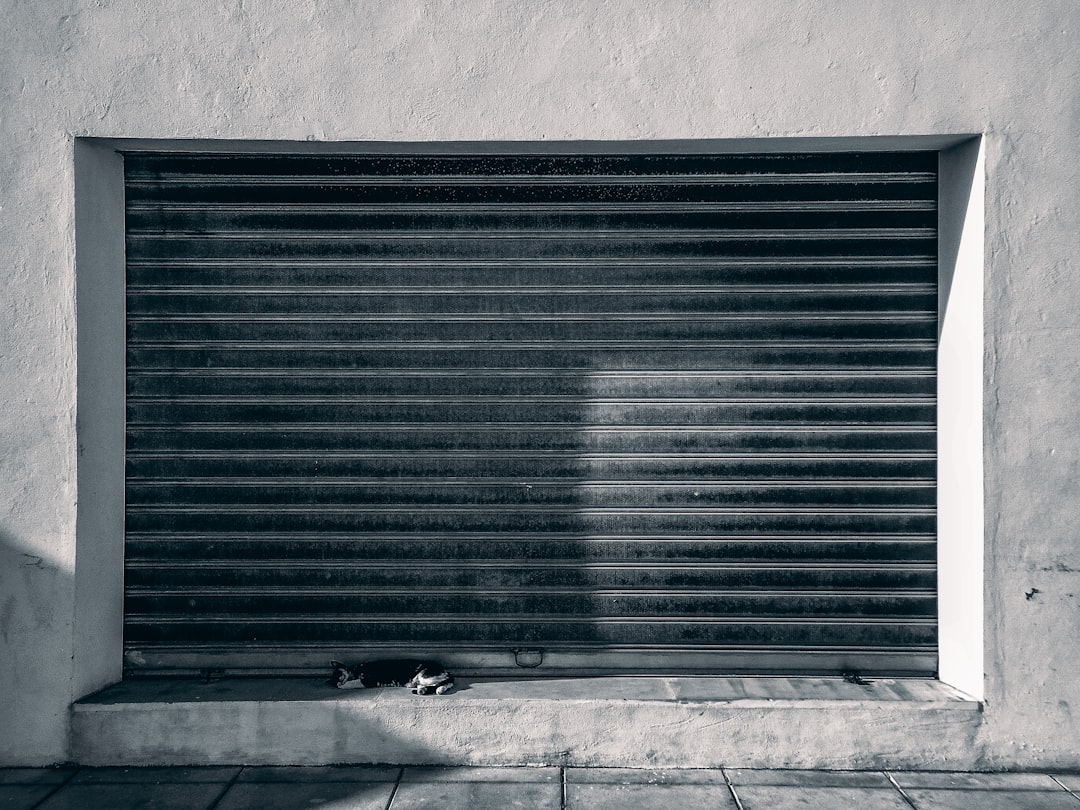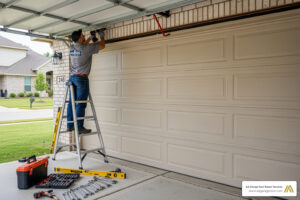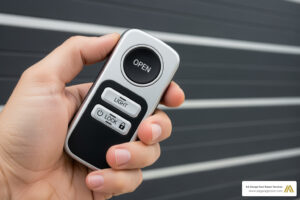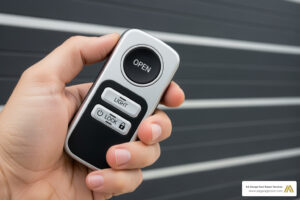Why Automatic Garage Door Repairs Require Expert Attention
Automatic garage door repairs are essential for addressing malfunctions in your home’s largest moving part. When your system fails, it’s more than an inconvenience for the 70% of homeowners using the garage as a primary entrance—it’s a security and safety risk. For those in the Twin Cities area, finding a trusted partner for reliable garage door services is the first step to restoring order. When you need expert help, professional garage door repair services provide the safety and experience to restore reliable operation quickly.
Common automatic garage door repair needs include:
- Broken springs – torsion or extension springs under extreme tension
- Opener malfunctions – motor, gear, or circuit board failures
- Damaged cables – frayed or snapped lifting cables
- Sensor issues – misaligned or faulty photo-eye sensors
- Track problems – bent, misaligned, or obstructed door tracks
- Worn rollers – deteriorated wheels causing noise and rough operation
Your garage door system operates under tremendous stress. Springs store enough energy to cause serious injury, while improper repairs can void warranties and create long-term problems. Research shows regular maintenance can extend your door’s lifespan by up to 50%, but when repairs are needed, professional expertise is non-negotiable.
I’m David Sands, owner of AA Garage Door LLC. For over 23 years, my team and I have provided automatic garage door repairs throughout Wisconsin and Minnesota. We’ve handled thousands of emergency calls, giving us insight into why these systems fail and how to fix them right the first time.
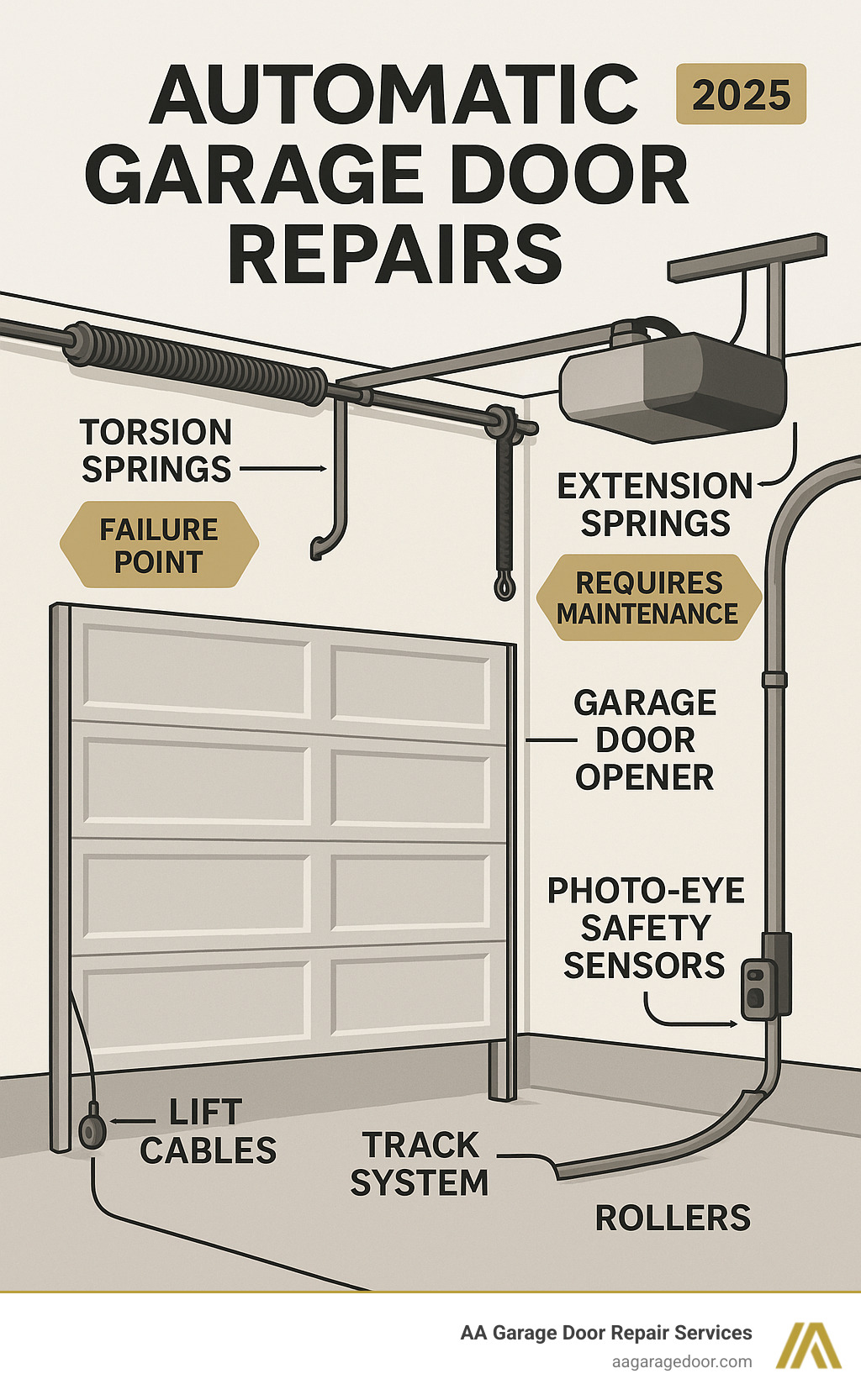
Simple automatic garage door repairs word guide:
Is Your Garage Door Crying for Help? Telltale Signs You Need a Repair
Your garage door will tell you when something is wrong—you just have to listen. Since 70% of homeowners use their garage as the main entrance, recognizing warning signs early can prevent costly repairs and dangerous situations. Ignoring strange noises or sluggish performance is like ignoring your car’s check engine light; the problem will only get worse.
Strange noises are often the first cry for help. If your once-quiet door suddenly grinds, squeaks, or pops, something is amiss. These sounds usually point to worn rollers, loose hardware, or issues with the springs or opener motor.
Slow response times are another red flag. A door that hesitates, stops midway, or moves sluggishly often signals a struggling opener motor, imbalanced springs, or electrical issues.
When your door goes off track, you have a serious safety hazard. A crooked or derailed door can result from impact, worn rollers, or a broken lift cable. Never try to force it back into place, as you’ll likely cause more damage.
Sagging door sections are a clear visual cue. If one side hangs lower or sections appear warped, you’re likely dealing with broken springs or structural damage that puts immense strain on the system.
Perhaps the most unsettling sign is unexplained opening and closing. A door operating on its own is a major security risk, often stemming from faulty wiring, remote interference, or a bad opener circuit board. Our guide on why your garage door opens or closes by itself explains these occurrences.
For a comprehensive look at warning signs, check our article on 10 signs it’s time to get your garage door serviced. Catching these issues early is key.
Common Culprits: The Most Frequent Garage Door Problems
After thousands of automatic garage door repairs, we’ve seen certain problems repeatedly. Understanding these helps you know what to expect.
Broken springs top our repair list. Torsion or extension springs counterbalance your door’s weight and operate under extreme tension. They typically last 10,000-15,000 cycles before failing, often with a loud bang. A broken spring makes the door incredibly heavy and nearly impossible to lift.
Snapped or frayed cables work with springs to lift the door. Over time, they can fray, rust, or snap, leaving your door lopsided and stuck.
Worn-out rollers make a big difference in smooth operation. Worn nylon or steel rollers lead to noisy, jerky movements. Replacing them is a straightforward fix.
Misaligned or bent tracks can halt your system. Impact, loose brackets, or ground settling can knock tracks out of alignment, causing the door to bind or derail.
Malfunctioning garage door openers are the brain of the system. With a 10-15 year lifespan, openers can suffer from stripped gears or faulty circuit boards, affecting safety and reliability. Specialized opener repair addresses these complex issues.
Damaged door panels from accidents or weather compromise your door’s structure and insulation. Individual panels can often be replaced without needing a new door.
Faulty safety sensors are critical for safety. These photo-eyes detect obstructions, but if dirty, misaligned, or damaged, your door may refuse to close. We’ve detailed the common reasons for garage door sensor troubles.
Our team stocks a wide range of parts, so we can often complete repairs in a single visit, even for emergencies.
The Dangers of DIY: Why Professional Repair is Non-Negotiable
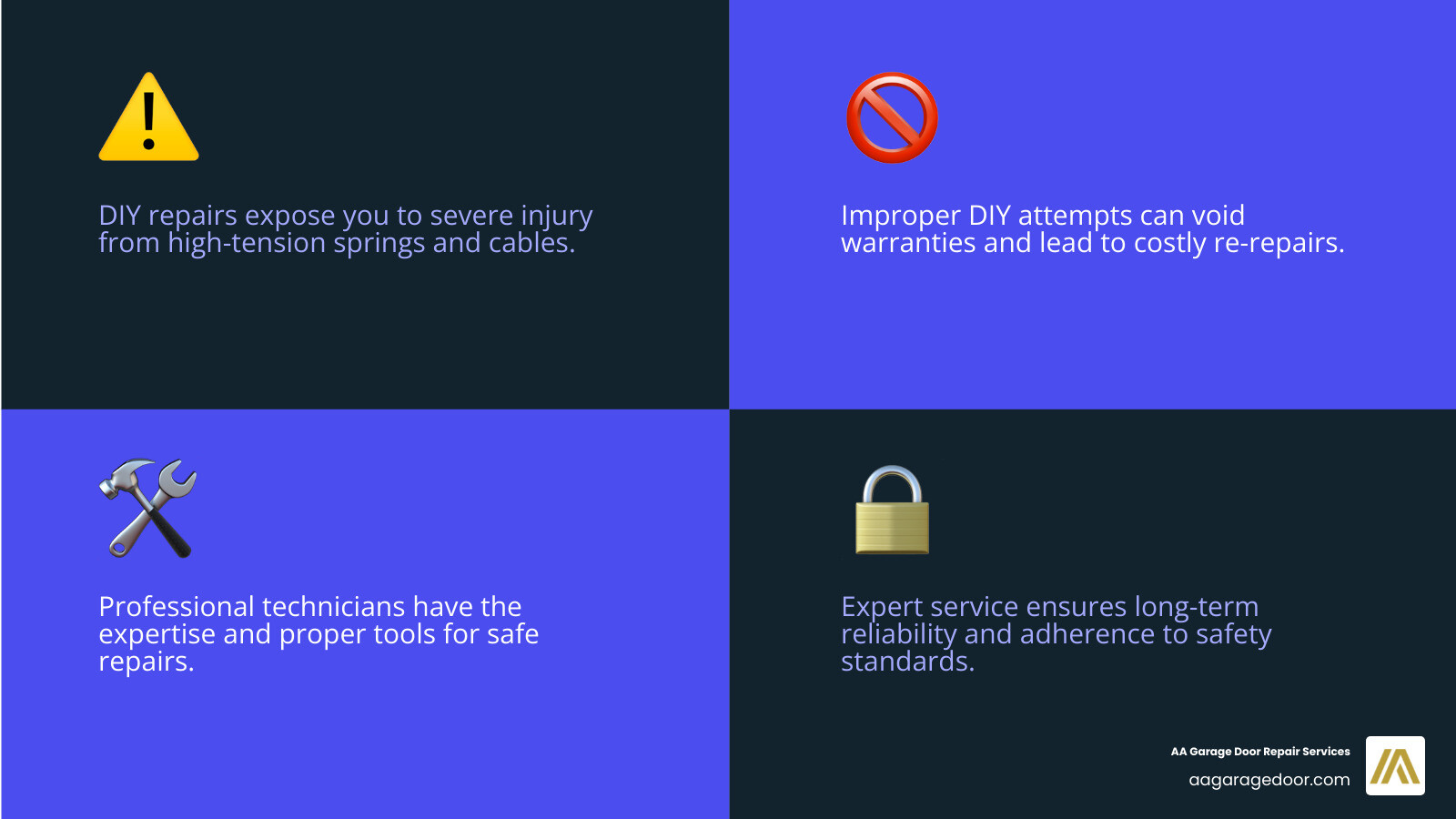
In my 23 years in this business, I’ve seen scary situations where homeowners attempted DIY automatic garage door repairs after watching a video, only to end up with serious injuries or thousands in additional damage.
While I support DIY projects, garage door repair isn’t one of them. The springs store enough energy to lift a 300-pound door, and an unexpected release can cause severe injuries. I’ve responded to calls where homeowners tried replacing springs themselves and ended up in the hospital.
The risks of DIY repair go beyond injury. Attempting repairs without training will likely void your warranty, as most manufacturers require certified professionals. We’ve also seen countless cases where an improper fix caused a domino effect of additional damage that a professional could have avoided.
Improper installation is another costly mistake. Without the right tools, it’s easy to misalign components or skip crucial safety checks, leading to premature wear and safety hazards.
Garage door systems are more complex than they appear. A simple spring replacement involves precise measurements and an understanding of the entire system. That’s why we always recommend leaving these repairs to trained professionals. For more details, see our guide on 3 Garage Door Repairs Best Left for the Professionals.
Safety First: Essential Features and Professional Standards
Modern garage doors are packed with critical safety features that save lives. These federally mandated systems require proper installation and testing by trained professionals.
- The auto-reverse mechanism, required since 1993, reverses the door if it hits an obstruction. We test this on every service call.
- Photo-eye sensors create an infrared beam that, when broken, reverses a closing door. Professional calibration is vital as they are easily knocked out of alignment.
- The manual release handle (red cord) is your emergency backup during a power outage. Using it incorrectly can be dangerous, especially with broken springs.
- Rolling code technology in remotes changes the access code with each use, preventing unauthorized entry.
Professional technicians stay current with safety standards like UL 325, which governs opener design. According to Underwriters Laboratories (UL), these standards ensure garage door openers include entrapment protection devices and proper force settings. When we perform repairs, we don’t just fix the problem; we verify all safety systems meet current standards. Our commitment to Garage Door Safety Tips for Homeowners includes educating our customers on how these features work.
Understanding the Costs and Process of Automatic Garage Door Repairs
Nobody likes surprise repair bills, and automatic garage door repairs are no exception. Costs vary based on the problem, parts, and location. Understanding these factors helps you make smart decisions and identify fair pricing. At AA Garage Door Repair Services, we believe in transparent pricing with no hidden fees. You’ll know exactly what you’re paying for before we begin.
Key factors that shape repair costs include:
- Type of repair: Realigning a sensor costs far less than replacing torsion springs.
- Quality of parts: We use high-quality parts that last, saving you money long-term compared to cheaper components that fail quickly.
- Labor complexity: A simple adjustment takes minutes, while rebuilding an opener motor requires hours of skilled work.
- Location and timing: Emergency calls may cost slightly more, but our pricing is fair across all communities we serve, from St. Paul to Hudson, Wisconsin.
For a detailed breakdown, see our guide: How Much Does Garage Door Repair Cost? Key Factors That Influence Pricing and What to Expect.
Typical Cost Ranges for Common Repairs
Here are ballpark figures for common automatic garage door repairs:
- Spring replacement: $150-$350. We recommend replacing both springs at once, as they wear at similar rates.
- Cable replacement: $150-$200. This fix restores balance and smooth operation.
- Opener repair: $100-$300+. A simple adjustment is on the low end, while motor or circuit board replacement costs more.
- Roller replacement: $85-$150. New rollers make a noisy door glide quietly.
- Track realignment: $125-$250. This depends on the severity of the damage.
These are estimates; we always provide a detailed, written quote before starting work.
What to Expect from Professional Automatic Garage Door Repairs
A professional repair call should be smooth and transparent. Here’s our process:
- Thorough Diagnosis: We examine the entire system—springs, cables, rollers, opener, and sensors—to identify the root cause and any underlying issues.
- Clear Estimate: Our technician explains the problem in plain English and provides a detailed written estimate breaking down all costs.
- Quality Parts & Efficient Repair: We stock our trucks with common, high-quality parts to complete most repairs the same day. Our technicians work efficiently with specialized tools.
- Testing and Final Inspection: We test the door’s operation and all safety features, like the auto-reverse and photo-eye sensors. Our thorough inspection process ensures nothing gets overlooked. We also share maintenance tips to help you keep your door running smoothly.
We want your door working perfectly long after we leave, not just temporarily patched up.
Choosing the Right Repair Service: A Homeowner’s Checklist
Finding the right company for automatic garage door repairs shouldn’t be a guessing game. In my two decades of experience, I’ve seen homeowners regret choosing the cheapest option or falling for salespeople who overpromise and underdeliver.
Your garage door repair is only as good as the technician performing it. A skilled professional diagnoses problems accurately, uses quality parts, and completes lasting repairs. An unreliable service can leave you with recurring issues or safety hazards. That’s why it’s crucial to do your homework. Look for a company with experience, reliability, and a commitment to customer satisfaction. Your garage door is a critical part of your home’s security and deserves professional attention.
For detailed guidance, check our guide: Select the Right Garage Door Repair Service for Safety and Reliability.
Key Qualities of a Top-Tier Garage Door Company
- Local Expertise and History: A company with deep local roots understands regional challenges, like how Minnesota’s winters affect springs. We’ve served the Twin Cities and surrounding areas since 2001, so we’ve seen it all.
- Positive Customer Reviews: Read what actual customers say on platforms like Google, Yelp, and the BBB. Consistent positive feedback is a sign of reliable service.
- Proper Licensing and Insurance: This is your protection. A reputable company will gladly provide proof of their credentials. Hesitation is a red flag.
- Transparent Pricing: You should receive a clear, written estimate before any work begins. Beware of vague quotes or hidden fees.
- Strong Warranties: A company that stands behind its work offers solid warranties on both parts and labor, giving you peace of mind.
- 24/7 Emergency Service: Failures happen at inconvenient times. A top-tier company offers round-the-clock emergency response. We’ve built our reputation on being there when customers need us most, as explained in our post on 24 Hour Garage Door Service: Your Lifesaver in Times of Need.
Choosing the right service is about building a long-term relationship with professionals who will keep your system running safely. Evaluate your options carefully and ask questions; the right company will provide clear, honest answers.
Frequently Asked Questions about Automatic Garage Door Repairs
We get a lot of questions about automatic garage door repairs, and we’re always happy to provide clear, helpful answers. Here are some of the most common inquiries we receive:
How often should I have my automatic garage door serviced?
Preventive maintenance is recommended at least once a year. Like a car tune-up, regular checks can identify minor issues before they become costly repairs. Regular maintenance can extend a garage door system’s life by up to 50%. During a service call, a technician will lubricate parts, inspect springs and cables, check door balance, and test all safety features. This proactive approach ensures optimal performance and safety.
Can a broken garage door spring be repaired, or must it be replaced?
A broken spring cannot be repaired; it must be replaced. Attempting to fix a spring is incredibly dangerous due to the extreme tension it’s under. This is a job for professionals. When one spring breaks, we highly recommend replacing both. They wear at a similar rate, so if one has failed, the other is likely not far behind. Replacing both ensures balanced operation and prevents another breakdown. See why you need professional spring replacement.
My garage door opener is making noise but the door isn’t moving. What’s wrong?
This often indicates a stripped gear in the opener motor or a disconnected trolley. The motor is running, but the force isn’t transferring to the door. This is common in older openers. Continuing to run it can cause more damage. If you hear the motor humming or grinding but the door is still, stop using it immediately. An immediate inspection is needed to diagnose the problem and perform the necessary repair.
Conclusion
Your garage door is your home’s largest moving part, but finding the right automatic garage door repairs shouldn’t be a headache. You’ve learned to spot the warning signs and understand why calling a professional is essential for your safety and wallet. The key to reliable operation is choosing a service that combines technical expertise with genuine care, transparent pricing, proper licensing, and 24/7 availability.
Here in the Twin Cities, St. Paul, and Western Wisconsin, AA Garage Door Repair Services has helped homeowners since 2001. We’ve seen every emergency imaginable, and our fast, reliable 24/7 emergency service means you’re never left stranded. Our commitment is to get it right the first time with transparent pricing and a satisfaction guarantee on every job.
We proudly serve communities throughout the region, including Minneapolis, Eagan, Brooklyn Park, Burnsville, Eden Prairie, Stillwater, Prior Lake, Plymouth, Maple Grove, Hudson WI, Baldwin WI, Woodbury, and Apple Valley.
Don’t let a malfunctioning garage door disrupt your life or compromise your security. The sooner you address the problem, the better. You can also schedule your garage door repair near Apple Valley and surrounding areas online.
Your garage door works hard. When it needs help, ensure it gets the professional care it deserves.

